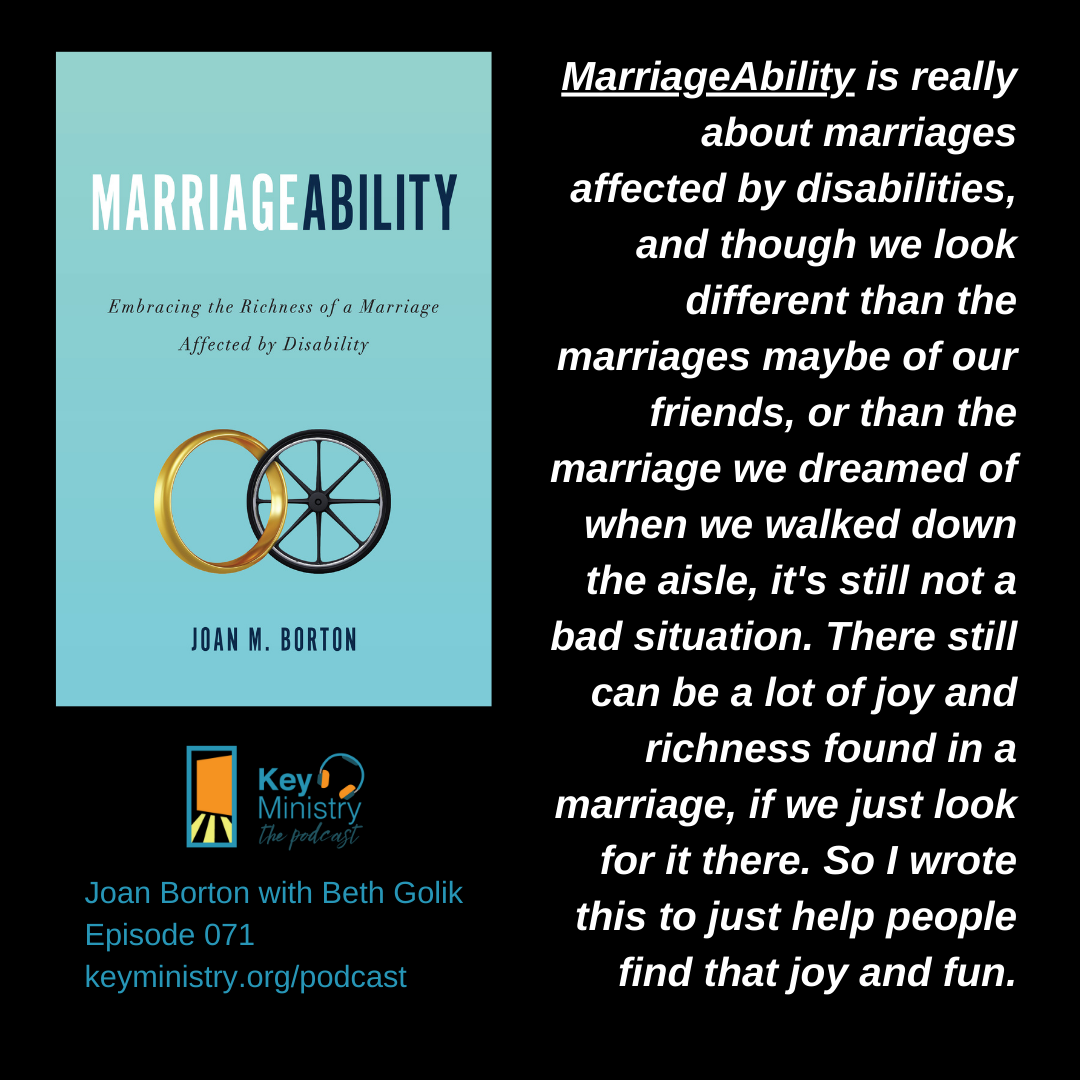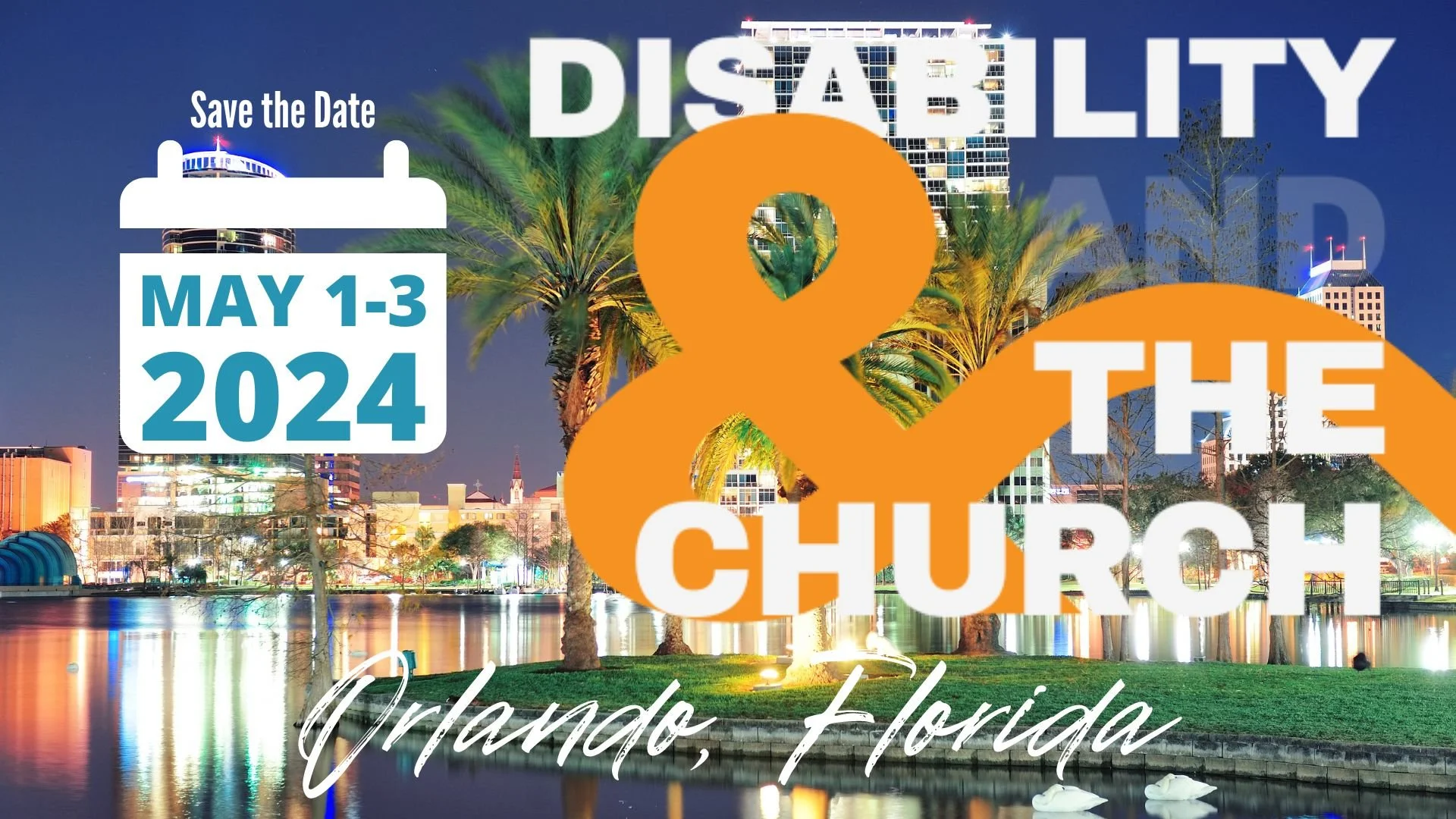In this week’s episode, Beth Golik sits down with Joan Borton, author of MarriageAbility, a new book that engages the reality disability puts on the marriage relationship, through the real-life, and often humorous, stories of couples living with disability.
Listen now in your favorite podcast app!
Quick links:
MarriageAbility by Joan M. Borton
If you enjoyed this episode, you may also like:
058: An Interview with David’s Table with Beth Golik
009: Disability is Beautiful with Beth Golik and Ryan Wolfe
Beth: Hi friends! This is Beth Golik from Key Ministry: The Podcast and I invite you to sit down with me as I talk with Joan Borton, author of the brand new book, MarriageAbility.
So I am so excited that Joan is here with me today. Before I ask you a whole bunch of questions, tell me a little bit about this book that is brand new, but tell me a little bit about—maybe give me a couple of sentences summary of the book, and then we're going to talk about why you wrote the book in the first place.
Joan: Okay, sounds good. Well, MarriageAbility is really about marriages affected by disabilities, and though we look different than the marriages maybe of our friends, or than the marriage we dreamed of when we walked down the aisle, it's still not a bad situation. There still can be a lot of joy and richness found in a marriage, if we just look for it there. So I wrote this to just help people find that joy and fun.
Beth: And there's a reason why you wrote that book, in addition to helping other people. So tell me a little bit about yourself, your marriage, you and Jerry; tell our listeners about it.
Joan: I've worked with people with disabilities for almost my entire career, and through that I met this guy named Jerry Borton, who happened to be born with cerebral palsy and uses a power wheelchair. And after we were conference buddies and friends for about six years, he asked God to have somebody like Joan show up where he lived, and instead, God told him the phone works to where she lives. So he started calling me. We did some long distance dating, email dating, those kinds of things, and then a few face-to-face datings in there as well. And 28 years ago this November, we got married. And so we have been living a life of not only people who work with people with disabilities, but a family affected by disability through Jerry's disability. And we've just found that people are so shocked: they think that all I am is a caregiver—and I do give caregiving for Jerry, but he gives back to me, and it's such a full, rich marriage overall.
Beth: I love it. I love it. And happy anniversary next month!
Joan: Thank you.
Beth: So tell me more. What was Jerry's role in the writing of this book?
Joan: Well, he is definitely Exhibit A. He's one of the prime examples that I use in the book of stories, and every story shared is with his blessing. But also, he was really the force behind me—driving me and motivating me. I started working on this book longer than we can even remember, and over time I noticed in the ministry we worked together, he kept taking things off my plate and giving them to somebody else, and I finally said, “What are you doing? I'm not going to have any work to do if you keep doing this.” He said, “You need to write. I want you to get this book done.” So he really was the one who freed me up and kept encouraging me saying, “Write the book, sit down and write the book.” And so I did.
Beth: I love it. I love it. Well, speaking of the book, could you share maybe one or two of your favorite stories from the book?
Joan: Sure. There's so many of them, especially since many of the stories involve Jerry, but they also—there are stories of other couples as well. So couples on all different levels could relate to the book. But I think one of my favorites was where we talked about the idea of submission, which sometimes gets such a negative rap in marriage, and in Christian circles, or even outside. And so I was reading through Ephesians one day, and I just went to him and said, in total seriousness, obviously from a very myopic point of view, “It's just not fair. The Bible tells me I have to submit twice, once to God and once to you. That's not fair.” And he said, “Did you read the rest of the story? Because what the Bible says for me as the husband is, ‘all I have to do is DIE!!’” And that really struck me, partly because of the drama, but if my husband is willing to give his life for me as he's commanded in scripture, then the idea of submitting is really a whole lot easier to do.
So that's one story that just has formulated our marriage and our thinking over the years. Another one I think would be just in learning adjustments, I think—in part—because we did long-distance dating. We weren’t together every day—doing things, playing games together, going out to dinner, figuring out how things work. And so soon after we were married, he had moved to California where I was and I wanted to treat him with his favorite meal, Cincinnati chili. And so I started to make it from scratch, which takes several hours for it to steep and all those types of things. And so while it was stewing, I guess I would say, we played a game, sat down to play a card game, and both of our families had played this game. We knew how to play. But partway through the game, I made a mistake, I realized, and I missed a play I could have made, and he capitalized on it and just whomped me, and I ended up just breaking down into tears, and he's like, “What is going on?” I said, “I'm making your favorite food and it takes so long. I put all this energy in and now you just didn't even give me a chance to get back in after I made that mistake.” And he's like, “Well, isn't that how you play the game?”
I said, “Well, not in my family.” And we realized—because he grew up with at least one brother and then lots of boys in the neighborhood, they played boy-like. And I grew up with—it was my mom and my sister and I who played games—so we played very nice, girl-like games. And so when I made a mistake at home, we’d go a round or two, and then let the other person gradually back in. But it was just a real eyeopener to us, of so many differences between our families, heritage or even just the way we grew up, that we needed to continually be talking and working through those and discovering them and understanding those, not thinking the other person was out to do something mean or awful to us—but that it's simply the way that we were raised or knew at that point in time.
Beth: Yeah, I think both of those stories share such an important perspective and insight, maybe for all marriages, not just those with disability. But what would you say to the single person who has a disability who's wondering if they're ever going to get married?
Joan: Right toward the end of the book, there is a chapter written for singles, because we get those calls fairly often, and they want to know why did I marry Jerry, or how can they get somebody to marry them, or will they get married? And obviously I can't tell you whether you're going to get married or not; that’s God’s knowledge, not mine. But what I know is rather than going out and looking and trying to find where do I find that person, how do I make myself become the most desirable me I could be for someone if I meet that person. So I try to redirect the single person back to asking them some questions, thinking through, are you prepared to live independently? And then, where are you at in your walk with God? Are you looking for somebody who's just going to be coming in to be your permanent caregiver, you think, and solve all your problems? Or what do you have to give to that person as well? So those are the kinds of questions that we need to work through over time, and help people adjust to that and understand and share with them some of the challenges and the struggles we've had, or other couples with disability in marriage. They will have those hard times; we did, too. And so they need to be able to know that they have a foundation, a friendship, and really knowing each other well and being a person of faith who clings to that, as they encounter those challenges.
Beth: Yes. Wow. This MarriageAbility sounds like such an important resource, not just for those who are currently married and living with disability, but those who are perhaps seeking to be married and living with a disability, and for ministry leaders—for our churches to share this with couples and other adults.
Joan: Along that line, every chapter ends with two sets of questions, embracing questions. One set is for the couple who lives with disability; the second set for friends or church members or ministry staff who want to know, ‘how do I come along somebody like Joan and Jerry, and help them in this area of oneness? Or how do I help them with the idea of attendant care and pca?’ So there are questions at the end of each chapter to give a fuller understanding to those who aren't disabled.
Beth: That's fantastic. So Joan, I imagine that our listeners are probably wanting to connect with you after hearing about this incredible new book. So we are going to put all these links in the show notes for this episode, which you can find at keyministry.org/podcast. But tell us a little bit about how they can order this book and how they can connect with you personally.
Joan: Okay, great. Thank you. The book is available in Kindle and print version both on Amazon, MarriageAbility—that's one word—MarriageAbility, with my name Joan Borton. And then it's also available through the ministry that Jerry and I work with, which is Luke 14 Exchange. And on the top of the website there's a little bar that says MarriageAbility, and you can click there and order directly from there. There's also several contact forms on the website, so if you want to reach out to me any one of those contact forms will get you to my email box or you can go directly to joan@luke14exchange.org.
Beth: Excellent. Thank you. So again, these links will be on keyministry.org/podcast. Joan, it has really been a pleasure to talk to you. I hope we get to see you and Jerry at Disability and the Church 2024, which will be happening in Orlando May 1 - 3, and information on that can be found keyministry.org/DATC2024. So, thank you, Joan so much for spending time talking with us today.
Joan: Well, thank you Beth for the invitation. I’ve enjoyed it and look forward to more partnerships with Key Ministry in the future.





